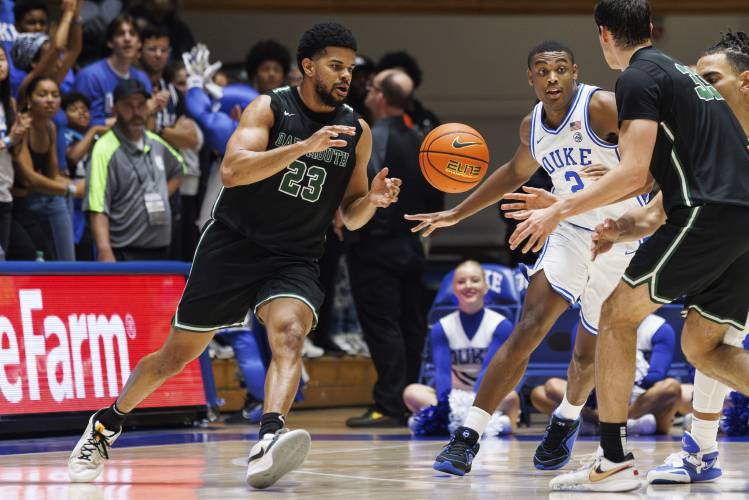As Dartmouth student-athletes push for unionization, UNH’s Michael McCann provides perspective on changing landscape

Dartmouth’s Robert McRae III (23) takes a pass from Jackson Munro (33) as Duke’s Jaylen Blakes (2) defends during a Nov. 6 game in Durham, N.C. A National Labor Relations Board regional official has decided that Dartmouth basketball players are employees of the school, clearing the way for an election that would create the first labor union for NCAA athletes. Ben McKeown / AP file
| Published: 02-11-2024 7:00 AM |
A resolution to the Dartmouth College men’s basketball players’ quest to be recognized as employees and unionize will likely take months to play out in court.
On Monday, the push by the Dartmouth student-athletes received a boost when Laura Sacks, a regional director for the National Labor Relations Board, ruled that they are employees of the school. This allows for an election in which the program could become the first in the NCAA to unionize.
Under the National Labor Relations Act, Sacks argued, the Dartmouth players are employees of the school because the school has the “right to control” the work they perform. In return, the players receive equipment, access to facilities and other perks.
Dartmouth is appealing the ruling to the National Labor Relations Board, a five-member panel in Washington D.C.
This initial ruling is similar to a 2014 attempt by Northwestern University football players to unionize in which a regional director for the labor relations board classified the student-athletes as employees. However, the NLRB overturned the decision, quashing the players’ hopes of being recognized as employees of the university.
But that was a decade ago, said Michael McCann, University of New Hampshire law professor and sports law expert. The college sports landscape has changed significantly since then, potentially imperiling the outcome for Dartmouth and the NCAA. Most notably, student-athletes are now legally able to profit from their name, image and likeness, an opportunity that was previously withheld from them.
“The commercialization of college sports has been going on a long time, so this isn’t unique to athletes, but now the athletes are able to get, or at least participate, in some aspects of that,” McCann said. “The other change is that we’ve seen courts be extremely critical of the NCAA and amateurism generally.”
The concept of amateurism — in this case, the belief that college athletes should not be treated as professionals and remain unpaid — has remained central to the NCAA’s argument against student-athletes receiving recognition as employees.
Article continues after...
Yesterday's Most Read Articles
Courts have not taken favorably to this position.
“A lot of political issues, you can kind of know what a conservative judge or what a liberal judge is going to say on it,” McCann said. “With this topic, they’re all being critical of the NCAA, so I think that has to be worrisome for Dartmouth and for the NCAA.”
Beyond just the ability for student-athletes to receive recognition as employees and unionize to negotiate wages with the schools they play for, other pieces like health-care access could come to the forefront as well, particularly health care for players after their careers are over.
“I know that’s something that some athletes have talked about, that they play sports and then they leave college injured, and the university doesn’t have a legal obligation,” McCann said. “The headlines are going to be that they’re going to get paid, but there are other aspects to it that are not just pay.”
There’s still a long way to go, though. If the NLRB upholds the ruling, there would likely be an appeal that could ultimately go all the way to the Supreme Court.
But, if the outcome remains that student-athletes are recognized as employees and can therefore join labor unions, McCann said that wouldn’t necessarily create a situation that’s foreign to colleges and universities. After all, schools already employ students who are part of unions.
“It seems exotic in the context of athletics, but it hasn’t been in other capacities. It will be a different world, but I don’t think we’re going to see college sports go away. NIL hasn’t led to college sports going away. If anything, it’s more popular now than ever,” McCann said.
“How many changes occur, we’ll have to see,” he added. “It sounds like a radical thing, but in practice it may not be as profound.”







 High schools: Baseball, softball, lacrosse and tennis results from this weekend
High schools: Baseball, softball, lacrosse and tennis results from this weekend Concord softball’s senior class reflects on a dominant four-year run
Concord softball’s senior class reflects on a dominant four-year run Softball: An eight-inning no-hitter for Maddy Wachter and a walk-off RBI from Sarah Taylor highlight Tide’s Senior Night
Softball: An eight-inning no-hitter for Maddy Wachter and a walk-off RBI from Sarah Taylor highlight Tide’s Senior Night In the face of tragedy, Franklin softball seeks togetherness
In the face of tragedy, Franklin softball seeks togetherness
